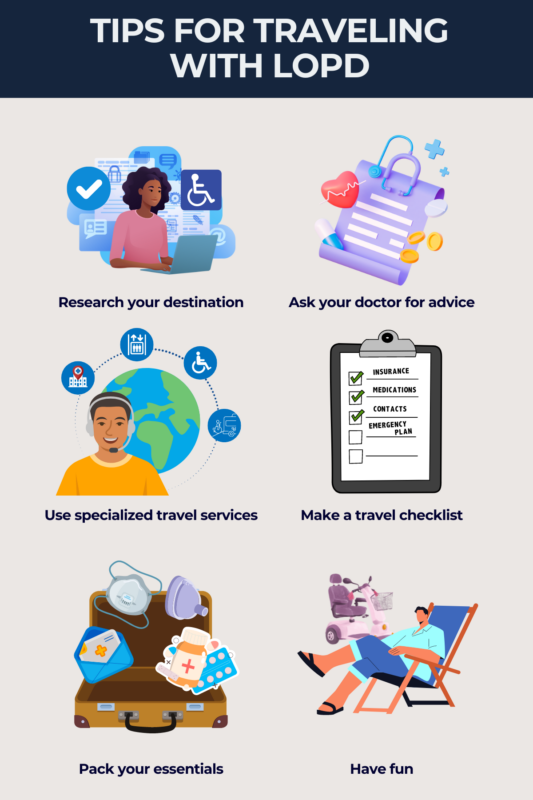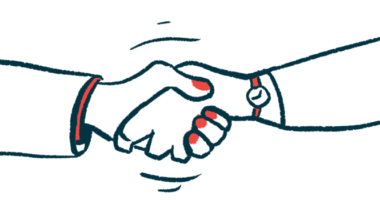 Discussion
Discussion
Traveling with LOPD: Preparing for your trip
Last updated April 29, 2024, by Susie Strachan
Traveling is never easy, but it poses extra challenges for people who have late-onset Pompe disease (LOPD).
But with proper advance planning — including arranging access to medical care, managing mobility, and other potential issues — memorable adventures are still on the horizon.
Select your destination
Traveling with Pompe disease means finding LOPD-friendly destinations that have:
- reliable and accessible medical facilities, including hospitals, clinics, and pharmacies, that, ideally, are able to handle Pompe disease treatment if required
- mobility-friendly accommodations, transportation, and public facilities
- mobility-friendly tours, sightseeing, outdoor activities, and cultural experiences.
In the U.S., the National Park Service posts information on accessible parks, including powered mobility devices that can be booked to take you on backwoods or beach adventures.
When planning a trip with LOPD, keep a number of key points in mind.
- Contact hotels, airlines, and tour operators in advance to inquire about accessibility features and request any accommodations.
- Research hotels that have accessible rooms for people using a wheelchair or similar mobility aids. You may want to call the hotel directly to be sure.
- Search online for transportation services for people who use a wheelchair or have other mobility issues.
- Consider destinations that have flat terrain and wheelchair-friendly roads and sidewalks.
- Be mindful of places that have temperature extremes and climate conditions that could make LOPD symptoms worse or affect your energy levels.
- If traveling to a country where you don’t speak the language, learn key phrases to help you communicate with healthcare providers, hotel staff, or emergency services. Another option is to find a good translation app on your smart device.
- Check vaccination requirements if traveling to places that might have malaria, hepatitis A, or typhoid, among others. Your doctor can determine if you need any vaccinations, which may have to be given well in advance of your trip, as some vaccines require multiple doses or take time to become effective.
LOPD symptoms such as fatigue, pain, difficulty eating, and brain fog also may present challenges while you are traveling:
- Airplane travel across multiple time zones can cause jet lag that can worsen Pompe disease-related fatigue and muscle weakness. It also can potentially put you at an increased risk for falls. Try adjusting your sleep schedule a few days before your trip to align with the time zone of your destination. You can talk to your doctor about medications to manage fatigue.
- Gastrointestinal symptoms caused by LOPD may flare up or worsen while traveling. Eating smaller and more frequent meals, choosing food carefully at restaurants, and packing snacks may help.
- LOPD-related difficulty with concentration, memory, or other cognitive functions can get worse if travel is tiring. Add in rest to your daily schedule and have a travel companion to help with decision making and navigating your destination.
Pompe Disease News columnist Dwayne Wilson says living with Pompe disease hasn’t stopped him from traveling and going on adventures. Wilson is semi-ambulatory and uses an electric wheelchair to navigate during excursions that involve extended periods of walking.
After being diagnosed with LOPD at the age of 50, Wilson has gone surfing for the first time, snorkeling in Hawaii, and tried wall climbing at an indoor facility. He has traveled from his home in California to Florida to see a Miami Dolphins game and to Cancun, Mexico.
“It seems that’s been a theme of mine throughout my Pompe journey: doing activities for the first time,” Wilson says. “Most recently, we did a birthday cruise to the western Caribbean celebrating me turning 56 on St. Patrick’s Day to hold a sloth on Roatan.”
He says the cute creature was a highlight of his trip.
Look into specialized travel services
Specialized travel services often have expertise in accessibility and can help find destinations, accommodations, and transportation options that are wheelchair friendly.
They also can create custom travel itineraries that take into account any LOPD-related limitations. These operators can recommend activities, attractions, and tours that are suitable for you and ensure the itinerary allows for rest breaks to manage fatigue.
Some travel operators also offer specialized services for people living with a chronic disease, such as:
- a medical liaison service to coordinate with your healthcare providers and ensure continuity of care during travel
- booking accessible ground transportation options such as wheelchair-accessible vans or taxis
- support in case of unexpected medical issues or emergencies during travel, such as assisting with hospital admissions or medical flights.
Pompe disease support groups are a good place to start when needing advice and practical LOPD travel tips, information about specific destinations or tours, and referrals to specialized travel services.

Speak with your doctor
Consult your doctor before finalizing your travel, as they may have advice for LOPD management at your intended destination and workarounds for your treatment with enzyme replacement therapy (ERT).
ERT is normally given every other week via intravenous (into-the-vein) infusion, so, if possible, plan your travel around your next session. Otherwise, ask your doctor about making treatment arrangements at your destination.
Your doctor will be able to help you with:
- planning for sufficient medication and medical supplies for the duration of the trip, including storage and transportation logistics for items like ERT medications
- providing you with a letter that outlines your medical condition, medications, and any special requirements for travel, especially if you are planning to travel by airplane or internationally
- obtaining a personal health record that has information about your condition, ongoing treatments, respiratory support requirements, and contact information in case of an emergency. This can be printed or set up on your smart device.
Plan your trip in advance
When traveling with a chronic illness such as LOPD, it can be helpful to prepare a checklist or travel plan that includes important information such as medications, what to do if you have a health issue, and emergency contacts.
Look into your health and travel insurance coverage. Ask your insurance agent to explain policy terms, exclusions, and limitations. Also check to see if they will assist with filing claims or obtaining assistance in case of travel disruptions.
Flying with a wheelchair can be of great concern. Depending on the size and type of wheelchair, you may have to check it at the gate.
Some things you can do to help protect your wheelchair for transportation in an airplane cargo hold include the following:
- Contact the airline in advance of the flight and provide details about the type and dimensions of your wheelchair.
- Remove any detachable items such as cushions, footrests, or bags, and label them with your name and contact information, and bag separately.
- Use protective padding or covers to help prevent damage during handling.
- Take a photo to verify your wheelchair is tagged with the correct destination and as proof in case it is damaged during transport.
- Upon arrival at your destination, check the wheelchair carefully for any signs of damage or mishandling before leaving the airport.
Pack your travel essentials
Essentials for traveling with LOPD go beyond ID, sunscreen, and a good book.
Some people with LOPD may require adaptive devices, such as ventilators for respiratory issues, or other medical devices for feeding, communicating, or mobility. Along with the equipment itself, be sure to pack charging cords, spare batteries, and cleaning supplies.
Many airlines have restrictions about using medical equipment in the airport or in the cabin during a flight. For example, ventilators needed for use during air travel must be battery-powered to comply with safety regulations. You should speak with the airline about the need to bring your ventilator onboard well in advance of your travel date.
Organize your medicines to ensure easy access to them at all times, especially the most important ones. Carry duplicate sets of medicines in additional bags, in case one of the bags gets lost.
Other travel essentials include:
- a medical letter from your doctor
- medications in original containers with prescription labels to avoid any issues with customs or airport security
- any necessary medical supplies, such as syringes, needles, catheters, or wound care supplies
- mobility aids, such as canes, walkers, or rollators
- supportive shoes and comfortable and loose-fitting clothing made from breathable fabrics
- a water bottle and snacks for longer journeys.
Know how to manage your symptoms
Planning ahead can help you mitigate health issues and allow you to focus on your adventure.
In addition to following your doctor’s recommendations, keep in mind these travel tips for symptom management:
- Take rest breaks, especially if you experience fatigue or muscle weakness.
- Have handy respiratory aids such as a portable oxygen concentrator.
- Make time to do exercises such as for breathing.
- Review your plan for managing medical emergencies.
- Stay hydrated and well nourished by carrying snacks or meal replacements and water.
Talk to your travel companions about any specific needs that can make your journey safer and more enjoyable. Don’t hesitate to ask for help or support when needed.
If you have any concerns while on your trip, don’t hesitate to contact your doctor or seek healthcare at your destination.
Pompe Disease News is strictly a news and information website about the disease. It does not provide medical advice, diagnosis, or treatment. This content is not intended to be a substitute for professional medical advice, diagnosis, or treatment. Always seek the advice of your physician or other qualified health provider with any questions you may have regarding a medical condition. Never disregard professional medical advice or delay in seeking it because of something you have read on this website.
Related articles
-
 Discussion
Discussion
-



